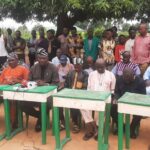By Luminous Jannamike, Abuja
In many democracies, including Nigeria, the separation of powers is a fundamental principle that ensures checks and balances among the three branches of government: the executive (president and cabinet), the legislature (parliament or congress), and the judiciary (courts).
However, when the president or governors exert undue influence over the legislature, it can lead to an imbalance of power that undermines the democratic process and generates heated debates within various circles in Nigeria’s political landscape.
Consequently, the effectiveness of the legislature at both the state and federal levels has been questioned by many. The central concern revolves around the imbalance of power, given that the President wields control over the National Assembly and handpicks its leadership. Additionally, state Houses of Assembly frequently succumb to the whims of governors, thereby undermining the notion of a genuinely democratic nation.
In light of this situation, Saturday Vanguard delved into the legislature’s shortcomings and sought input from lawyers, activists, and stakeholders regarding potential solutions to foster a more equitable and representative system in Nigeria’s democracy.
Hold elected representatives to account, Prof. Nwekeaku urges Nigerians
Prof. Charles Nwekeaku, Secretary of the Igbo Elders Consultative Forum (IECF), voiced his concerns about the current state of affairs. His words:
“I don’t blame the president or governor, but rather the lawmakers we elected to represent us. They enter the legislative houses, engage in corrupt practices, and betray those who elected them. Rather than representing us, they prioritize their personal gain and the well-being of their families, However, I also hold Nigerians responsible for this issue, as we must ensure that those who represent us are held accountable. Therefore, this is the root of the problem”.
Why lawmakers fail Nigerians —Rafsanjani
Auwal Musa Rafsanjani, Head of Transparency International (Nigeria) and Executive Director of Civil Society Legislative Advocacy Centre (CISLAC) lamented the dysfunctionality of the multi-party system and rampant political corruption. He said, “If there were an even distribution of legislators across the 18 political parties in the country, it would be very difficult for the president to manipulate the National Assembly. The determination of leadership positions should be made solely by the elected members of the National Assembly, without undue interference from the president”.
Legislative Houses, mirror of political environment —Bishop Adegbite
Bishop Stephen Adegbite of the Methodist Church Nigeria, Diocese of Ikeja, also weighed in on the matter, offering a nuanced perspective. He noted that while the leadership of the legislature reflects the political environment and alignments of the nation, the focus should not be solely on regional representation. According to him, “In our democracy, the leadership of the National Assembly is influenced by the political environment and alignments of the nation. However, it’s crucial to remember that competence and capability should never be compromised. If we are serious about progress, we must prioritize competence, accountability, and the ability to deliver. Once we prioritize these qualities, positive changes will follow”.
Constitutional amendment needed —Barr. Nzeakor
Taking a legal standpoint, Mr Victor Nzeakor highlighted the subservience of state Houses of Assembly to governors and the dominance of the President over the National Assembly as significant issues.
He proposed a solution: “We need to amend our constitution to ensure a truly independent legislature, with a transparent and merit-based process for selecting its leaders. “For instance, the 1999 constitution (as amended) should protect the autonomy of the legislature by ensuring its financial independence, administrative control, and freedom from external interference. This includes provisions for the legislature to control its funding, determine its internal rules, and safeguard against undue influence by the executive. “The subservience of state Houses of Assembly to governors hampers their ability to act as true representatives of the people and the dominance of the President over the National Assembly undermines the principle of a truly independent legislature.”
In addition to constitutional reforms, Nzeakor stressed the importance of civic engagement and the need for citizens to hold their representatives accountable. “It is also crucial for Nigerians to actively engage with their representatives, voicing their concerns and demanding better governance,” he also said. According to him, by actively participating in the democratic process, citizens can demand transparency, inclusivity, and accountability from their lawmakers, gradually shifting the power dynamics.
The common thread in these conversations is the call for Nigerians to actively engage with their representatives, voicing their concerns and demanding better governance. It’s clear that for change to occur, Nigerians must take a proactive stance in holding their elected officials accountable. While the legislature in Nigeria continues to grapple with challenges that undermine the democratic ideals it should uphold, there is hope for change.
Through constitutional reforms, increased civic engagement, and accountable governance, Nigeria can pave the way for a more vibrant and inclusive democracy. Nevertheless, the legislature must rise to the occasion and redefine its role as the true voice of the people.
It’s a long road to reshaping the democratic narrative, but with concerted efforts and a focus on transparency, competence, and accountability, a more balanced and democratic Nigeria is possible.
The post Why lawmakers are subservient to executive —Clerics, activists, lawyers appeared first on Vanguard News.





